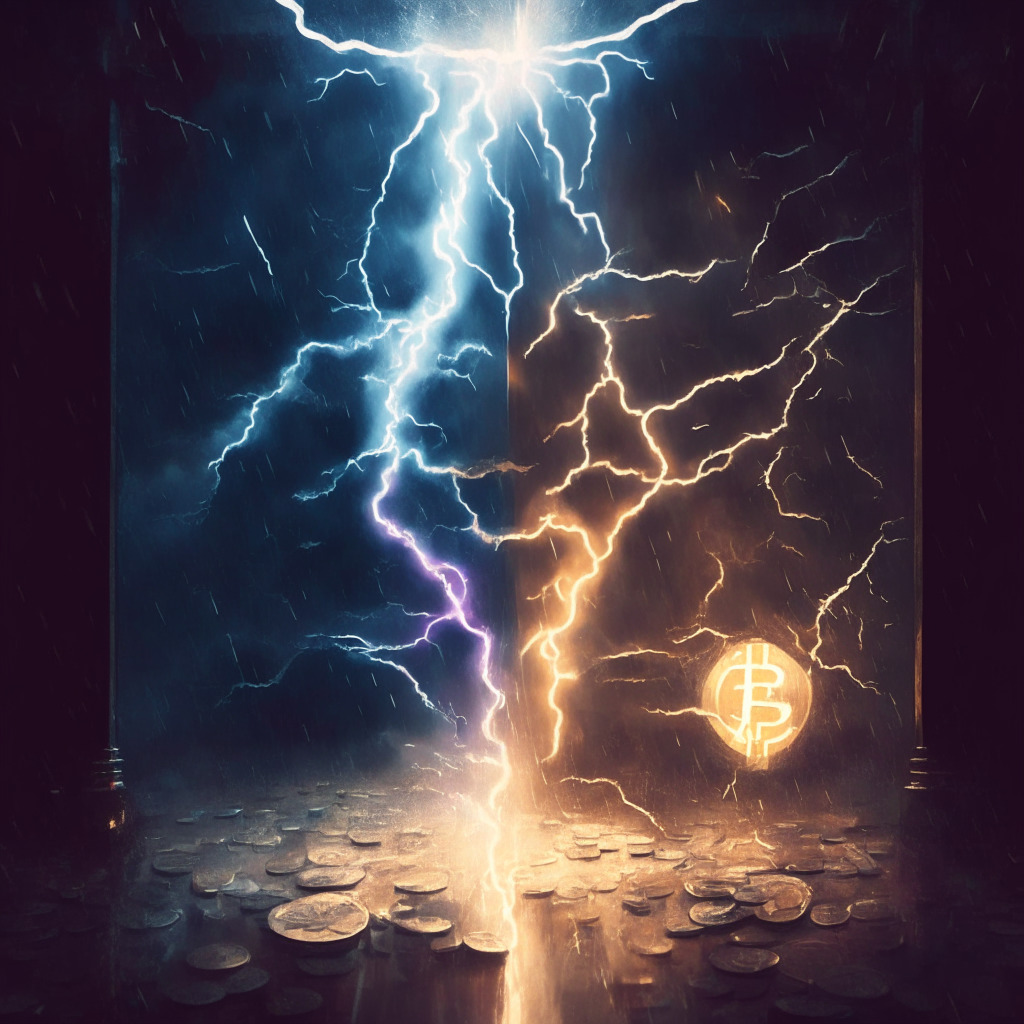“Crypto giant Coinbase inaugurates a Web3 wallet primarily focused on aiding institutions to venture into NFTs and other aspects of decentralized finance. The wallet, under the Coinbase Prime division, offers a gateway to crypto, NFTs, decentralized apps, and a broader DeFi spectrum, while ensuring the safety and security of client’s assets.”
Search Results for: Coinbase Wallet
Massive Ethereum Movements: Buterin’s Wallet Activity Sparks Market Speculation
“A series of large Ethereum transactions linked to Vitalik Buterin have been detected, including a 400 ETH transfer to Coinbase. These deposits, ranging over 10 days and amounting to nearly $3.94 million, have sparked speculation about a potential sell-off and its impact on the ETH price.”
Coinbase’s Huge BTC Holdings: Sign of Dominance or Call for Decentralization?
“Cryptocurrency exchange Coinbase reportedly holds 1 million Bitcoin, about 5% of total in existence. However, fears of centralized exchanges halting withdrawals have caused controversy. The company’s ongoing accumulation amid regulatory scrutiny also raises concern. Conversely, its holdings and financial performance highlight its industry dominance.”
Coinbase Obtain AML Compliance in Spain: Striking Balance between Global Expansion and Regulatory Challenges
Coinbase has secured an Anti-Money Laundering compliance registration from Spain’s central bank, enabling crypto services in the country. As Coinbase expands globally, it faces possible complications from varying regulatory frameworks and is urged to prioritize asset security as skeptical holders consider withdrawing assets.
Coinbase Holds 5% of all Bitcoin: A Potent Mix of Power and Risk
“Coinbase, a major crypto exchange, now holds 5% of all existing Bitcoin, according to recent data from Arkham, a blockchain intelligence platform. However, this significant holding belongs chiefly to various investors using Coinbase’s platform, emphasizing the continual need for safety measures.”
Coinbase CEO Confirms Lightning Network Integration: A Strategic Move to Enhance Transaction Efficiency
Coinbase CEO, Brian Armstrong, recently announced the firm’s plan to bring the Bitcoin Lightning Network into its operations. This second-layer solution improves transaction speeds, enabling competition with more efficient solutions. Coinbase’s move is expected to give them a competitive advantage in the increasing crypto market competition.
Unpacking Telegram & Coinbase’s Crypto Integration: Boost or Bottleneck for Blockchain?
Messaging app, Telegram integrates a crypto wallet, available to its 800 million global users, potentially positioning it as a mainstream blockchain platform. Simultaneously, crypto exchange Coinbase integrates Bitcoin’s layer 2 payment protocol, Lightning Network, promising faster transactions. Despite apparent benefits, the integration process and exclusions pose potential drawbacks.
Coinbase and Binance Embrace Bitcoin Lightning Network: A Boon or a Bane?
Coinbase, a major cryptocurrency exchange, has confirmed plans to incorporate the Bitcoin Lightning Network (LN), aiming to solve Bitcoin’s scalability problems. This decision, which surprised some industry bigwigs, signifies a commitment to enhancing transaction speed and reducing fees for Bitcoin, the largest cryptocurrency. Moreover, concerns were raised about misleading metrics often used to gauge a cryptocurrency’s health.
Navigating Uncertainty: The Rocky Road of Coinbase’s Operations in India
Coinbase suspended exchange services in India but continues its technology hub and wallet services. Despite conflicts with regulatory pressures and market volatility, Coinbase upholds its commitment to India, viewing it as an opportunity despite local constraints.
Navigating the Indian Crypto Market: Coinbase’s Struggles and Opportunities
Coinbase’s pursuit of the vast Indian crypto market is hampered by regulatory hurdles and authority negotiations. Despite termination of its service for some customers, it continues to operate. With high-profile exits and a confrontation with the Reserve Bank of India, the crypto giant faces challenges in adapting to the country’s market standards. Nonetheless, India’s advocacy for global crypto regulatory structures might signal a shift in the tides.
Coinbase’s Global Game Plan: Tapping into Foreign Markets Despite US Regulatory Tensions
Coinbase, a global digital asset exchange, plans to expand its operations into Canada, the UK, Australia, Brazil, Singapore, and the European Union, prioritizing these markets due to more progressive digital asset regulations. This decision came after acknowledging restrictive regulations in the US market as a significant impediment. Key strategies for expansion include partnering with banks, payment service providers, and increasing local community engagement.
Infamous Chisel Malware: The Hidden Threat to Crypto Wallets on Android Devices
“Crypto wallet owners are warned of a new malware, “Infamous Chisel,” linked to the Russian military intelligence agency. It targets Android devices, primarily Binance, Coinbase and Trust wallet applications, posing a significant threat to crypto security.”
Coinbase: A Journey through Tech Glitches, User Experience Innovations, and Regulatory Challenges
Recently, Coinbase users encountered a bug resulting in the display of empty wallet balances, impacting the ability to add or import wallets. Despite setbacks including a 70% transaction slump and regulatory pressures, Coinbase continues seeing success, including a 156% stock gain this year.
Coinbase Halts Trading of Stablecoins Amid Tough Crypto Regulations in Canada
Coinbase, a major cryptocurrency exchange, announces the suspension of trading for three popular stablecoins in Canada starting from August 31. Despite the trading halt, the wallets will still be functional for deposits and withdrawals. However, Canada’s stern stance towards crypto service providers and stringent regulations have led to many crypto exchanges, including Binance and OKEx, pulling out from the Canadian market.
Rising On-Chain Activity Exposes User Experience Flaws in Coinbase App
Brian Armstrong, CEO of Coinbase, has recognized major user experience flaws within the Coinbase app. These issues emerged during the surge in on-chain activities on the layer-2 network, Base, particularly involving NFTs, Dapps, and Layer 2 solutions. Despite significant improvements, Armstrong admits much work remains and welcomes user feedback for prioritized resolution. This revelation underlines the importance of app usability and user experience in the volatile crypto world.
Coinbase’s Layer-2 Network Challenge: Balancing Blockchain Complexity with User Experience
Coinbase’s CEO, Brian Armstrong, recently addressed user experience (UX) issues surrounding its application, specifically for non-fungible tokens, decentralized apps, and layer-2 operations. The company’s commitment to user feedback, swift problem resolution, and focus on UX improvement is also propagating hope for the entire blockchain sector’s advancement.
Unmasking BitForge: The Hidden Vulnerabilities of Multi-Party Computation Technology in Crypto Wallets
Fireblocks, a crypto infrastructure company, exposed vulnerabilities, known as “BitForge”, in crypto wallets that use multi-party computation (MPC) technology. High-profile firms including Coinbase, ZenGo, and Binance quickly partnered with Fireblocks to counter these vulnerabilities, thus safeguarding against potential exploitation. The vulnerabilities highlighted safety issues about the previously assumed secure MPC wallets.
Exploring Coinbase’s Onchain Summer: NFT Oversaturation vs Blockchain Mainstream Meld
Coinbase’s upcoming Onchain Summer, coinciding with the launch of its Layer 2 network, Base, aims to increase crypto accessibility via various activations within the Web3 space. The event showcases the intersection of blockchain with mainstream industries like Coca-Cola. However, concerns about value dilution of NFTs and its strategic boost for Base’s engagement are also signified.
Unmasking the BitForge Vulnerability: A Wake-up Call for Crypto Wallet Security
“Blockchain security firm, Fireblocks, revealed a vulnerability in crypto wallets using multi-party computation (MPC) technology, affecting major wallets like Coinbase and Binance. Rapidly addressed, the incident underscores the inherent risks in the Web3 domain and the importance of vigilance and proactive security measures in crypto.”
BitForge Vulnerabilities Exposed: Revisiting Crypto Wallet Security and the Future of MPC Technology
Fireblocks, a crypto infrastructure company, exposed a series of vulnerabilities, termed BitForge, in commonly used crypto wallets running on multi-party computation (MPC) technology. Posing a risk of enabling untraceable funds withdrawals, these vulnerabilities challenge the reliability and security of ‘ultra-safe’ MPC wallets and prompt a review of crypto security safeguards.
Coinbase CEO’s Firm Stand on Staying in U.S. Despite Regulatory Hurdles: A Brave New Path?
“Coinbase CEO, Brian Armstrong, recently dispelled rumors of the crypto exchange planning a move from the U.S. amid regulatory challenges. Armstrong affirmed the company’s commitment to navigate the U.S. regulatory environment, highlighting the need for pioneers and regulators to work together for technological growth and consumer protection.”
Coinbase’s Q2 Results: Surpassing Revenue Estimates Amid Shrinking Losses, A Tale of Resilience or Downfall?
“Coinbase, a major U.S. based exchange, faced its sixth straight quarterly loss, albeit smaller at $97 million from a previous year’s $1.1 billion. Despite this, their revenue exceeded market estimate, landing at $707.9 million up from the predicted $631.2 million.”
GameStop Abandons Crypto Wallets: Combat or Capitulation Against the US Regulatory Pressure?
“GameStop, after a year of providing crypto wallets, plans to withdraw support due to US regulatory uncertainties. The removal of these crypto conduits, facilitating transactions on GameStop’s NFT marketplace, aligns with considerable staffing reductions. This reflects intense scrutiny by regulatory bodies, prompting some cryptocurrency companies to consider overseas operations.”
Unlocking the Future: Optimism’s Beam Wallet Redefines Crypto Transactions
“Step into the future with blockchain-based Beam wallet. This innovative application uses Twitter for login, eliminating the need to store seed words. Backed by top Web3 venture capitals, it aims to enhance user experience, increase adoption rate and ensure security by not landing passwords on a centralized server.”
Cryptosphere Weekly Roundup: Market Fluctuations, Sec Regulations, and Wallet Safety
“In a tumultuous week for the cryptosphere, signs of a five-quarter drop in crypto investment emerged, yet developments like Neon EVM’s unique offering to build Ethereum applications on Solana, showed promise. Amidst market fluctuations, regulatory pressures and unique crypto innovations, this sector’s dynamics continue to surprise, underscoring the importance of wallet safety in navigating the digital ocean.”
Coinbase Revolutionizes Crypto with Encrypted Messaging: A Trend or Tryst?
“Coinbase announces its self-custody wallet will soon double as an encrypted messaging service, powered by XMTP—a web3-based decentralized communications network. This enables users to interact differently with their wallets, facilitating secure, personal transactions and extending the realm of cryptocurrencies.”
Exploring Coinbase’s New Encrypted Messaging: Pioneering Innovation or a Step too Far?
“Coinbase has revealed a new feature allowing encrypted messaging between its crypto wallet users. This innovative feature is supported by the Ethereum addresses and the XMTP communications protocol. While it offers an effortless communication experience and transactional transparency, its potential is limited by not recording exchanges on a blockchain.”
Beware of the Deceptive Tactics: Coinbase Domain Name Scams and Security Measures
“Scammers are increasingly using the domain name of famous cryptocurrency exchange, Coinbase, for sophisticated attacks, including phishing attempts. With the spike in such scams, it’s essential for users to remain vigilant and employ robust security measures like strong unique passwords and two-factor authentication.”
Cardano’s Future: Mainnet and Wallet Upgrades Amid Regulatory Challenges
Cardano announces the launch of Node 8.1.1 mainnet release and Lace 1.2 wallet upgrade, offering improvements and new features. Despite regulatory challenges, the community remains committed to enhancing the network. These innovations could impact ADA’s price, but caution and thorough market research are essential.
Exploring the Impact of Self-Custody Wallets on Bitcoin Market and Network Utility
The increasing trend of Bitcoin being sent to self-custody wallets is impacting the cryptocurrency market significantly, leading to decreased circulation and reduced market capitalization. However, current exchange activity may offset the negative effects as long as it remains healthy.
Bitkey Integration with Cashapp and Coinbase: Boon or Bane for Crypto Decentralization?
Jack Dorsey’s FinTech company, Block, plans to merge its self-custody bitcoin wallet, Bitkey, with Cashapp and Coinbase, enabling users to buy and sell bitcoin within the app. However, critics argue that this integration raises centralization and security concerns in an industry built on decentralization.
Apple’s Clash with Crypto Wallets: Balancing Innovation, Regulation, and Safety
Apple recently rejected non-custodial Lightning-enabled bitcoin wallet, Zeus, after a disagreement concerning decentralized social media platform Damus. Zeus allegedly violated Apple’s guidelines requiring appropriate licenses for cryptocurrency transmission. The compromise between Zeus and Apple is essential for the growth and adoption of cryptocurrencies.































